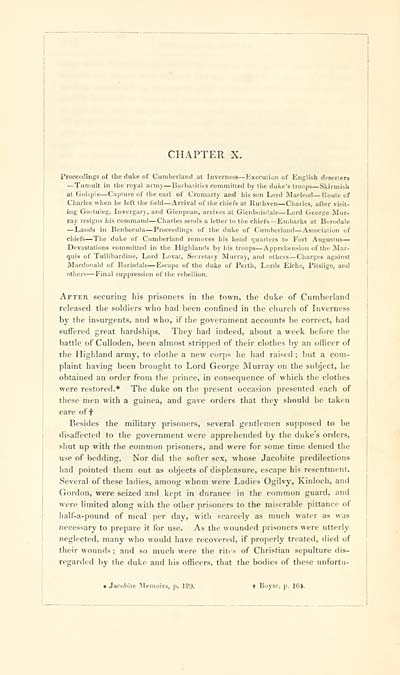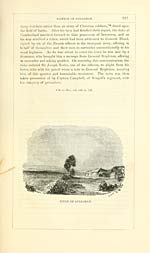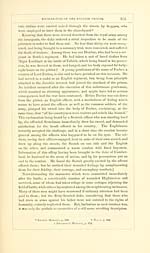Download files
Complete book:
Individual page:
Thumbnail gallery: Grid view | List view

CHAPTER X.
Proceidings of the duke of Cumberland at Inverness— Execution of English doseriera
—Tumult in the royal armj — Barbatilits committed by the duke's troops— Skirmish
at Golspie — Capture of the earl of Cromarty and his son Lord Blacleod — Itoule of
Charles nhen he left the lield— Arrival of llie chiefs at Ruiliven— Charles, after visit-
ing Goituleg, Invergary, and Glenpcan, arrives at Glenboisdale — Lord George Mur-
ray resigns his command — Charles sends a letter to tlie chiefs— Enjliarks at Burodale
—Lands in Benbecula— Proceedings of the duke of Cumberland— Association of
chiefs — The duke of Cumberland removes his head quarters to Fort Augustus —
Devastations committed in the Highlands by his troops — Appreliensioii of the Mar-
quis of TuUibardine, Lord Luvat, Secrelaiy Murray, and others— Charges against
Macdonald of Barisdale— Escape of the duke of Peith, Lords Elclio, Fiisligo, and
others — Final suppression of the rebellion.
After securing his prisoners in the town, the duke of Cumberland
released the soldiers who had been confined in the church of Inverness
b}' the insurgents, and who, if the government accounts be correct, liad
suffered great hardships. They had indeed, about a week before the
battle of CuUoden, been almost stripped of their clothes by an officer of
the Highland army, to clothe a new corps he had raised ; but a com-
plaint having been brought to Lord George Murray on the subject, he
obtained an order from the prince, in consequence of which the clothes
were restored.* The duke on the present occasion presented each of
these men with a guinea, and gave orders that they should be taki^n
care off
Besides the military prisoners, several gentlemen supposed to be
disaffected to the government were apprehended by the duke's orders,
shut up with the common prisoners, and wei'e for some time denied the
u^ie of bedding. Nor did the softer sex, whose Jacobite predilections
had pointed them out as objects of displeasure, escape his resentment.
Several of these ladies, among whom were Ladies Ogilvy, Kinloch, and
Gordon, were seized and kept in durance in the common guard, and
were limited along with the other prisoners to the miserable pittance of
half-a-pound of meal per day, with scarcely as much water as was
necessary to prepare it for use. As the wounded prisoners were utterly
neglected, many who would have recovered, if properly treated, died of
their wounds; and so much were the ritt s of Christian sepulture dis-
regarded by the duke and his officers, that the bodies of these unfortu-
• Jacl Memoirs, p. 129. t B"ysc, p. 101..
Proceidings of the duke of Cumberland at Inverness— Execution of English doseriera
—Tumult in the royal armj — Barbatilits committed by the duke's troops— Skirmish
at Golspie — Capture of the earl of Cromarty and his son Lord Blacleod — Itoule of
Charles nhen he left the lield— Arrival of llie chiefs at Ruiliven— Charles, after visit-
ing Goituleg, Invergary, and Glenpcan, arrives at Glenboisdale — Lord George Mur-
ray resigns his command — Charles sends a letter to tlie chiefs— Enjliarks at Burodale
—Lands in Benbecula— Proceedings of the duke of Cumberland— Association of
chiefs — The duke of Cumberland removes his head quarters to Fort Augustus —
Devastations committed in the Highlands by his troops — Appreliensioii of the Mar-
quis of TuUibardine, Lord Luvat, Secrelaiy Murray, and others— Charges against
Macdonald of Barisdale— Escape of the duke of Peith, Lords Elclio, Fiisligo, and
others — Final suppression of the rebellion.
After securing his prisoners in the town, the duke of Cumberland
released the soldiers who had been confined in the church of Inverness
b}' the insurgents, and who, if the government accounts be correct, liad
suffered great hardships. They had indeed, about a week before the
battle of CuUoden, been almost stripped of their clothes by an officer of
the Highland army, to clothe a new corps he had raised ; but a com-
plaint having been brought to Lord George Murray on the subject, he
obtained an order from the prince, in consequence of which the clothes
were restored.* The duke on the present occasion presented each of
these men with a guinea, and gave orders that they should be taki^n
care off
Besides the military prisoners, several gentlemen supposed to be
disaffected to the government were apprehended by the duke's orders,
shut up with the common prisoners, and wei'e for some time denied the
u^ie of bedding. Nor did the softer sex, whose Jacobite predilections
had pointed them out as objects of displeasure, escape his resentment.
Several of these ladies, among whom were Ladies Ogilvy, Kinloch, and
Gordon, were seized and kept in durance in the common guard, and
were limited along with the other prisoners to the miserable pittance of
half-a-pound of meal per day, with scarcely as much water as was
necessary to prepare it for use. As the wounded prisoners were utterly
neglected, many who would have recovered, if properly treated, died of
their wounds; and so much were the ritt s of Christian sepulture dis-
regarded by the duke and his officers, that the bodies of these unfortu-
• Jacl Memoirs, p. 129. t B"ysc, p. 101..
Set display mode to: Large image | Transcription
Images and transcriptions on this page, including medium image downloads, may be used under the Creative Commons Attribution 4.0 International Licence unless otherwise stated. ![]()
| Early Gaelic Book Collections > Ossian Collection > History of the Highlands and of the Highland clans > Volume 3 > (292) |
|---|
| Permanent URL | https://digital.nls.uk/79655926 |
|---|
| Description | Vol. III. |
|---|---|
| Shelfmark | Oss.249 |
| Attribution and copyright: |
|
| Description | Selected books from the Ossian Collection of 327 volumes, originally assembled by J. Norman Methven of Perth. Different editions and translations of James MacPherson's epic poem 'Ossian', some with a map of the 'Kingdom of Connor'. Also secondary material relating to Ossianic poetry and the Ossian controversy. |
|---|
| Description | Selected items from five 'Special and Named Printed Collections'. Includes books in Gaelic and other Celtic languages, works about the Gaels, their languages, literature, culture and history. |
|---|

